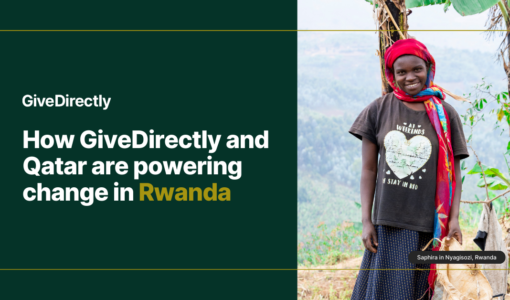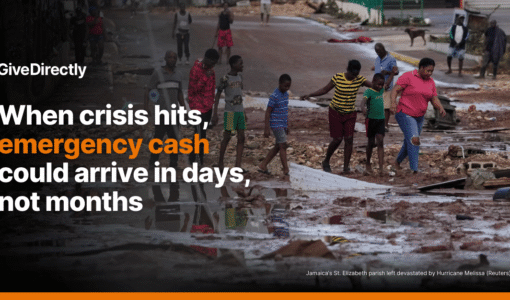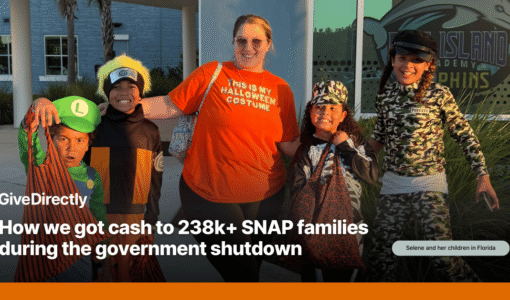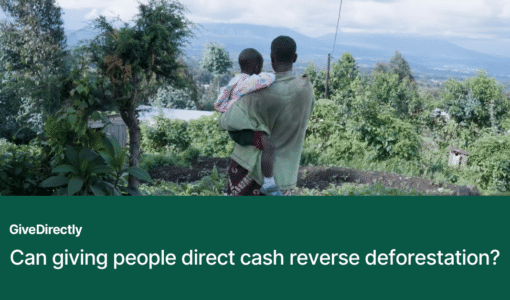The Toronto Star covered the history of basic income this week, mentioning GiveDirectly’s experiment as an initiative that can “link donor cash directly to study recipients.” In The Huffington Post, GiveDirectly’s own Jacquelline Fuller describes how she first heard of the concept of giving cash to poor families. Throughout the world, basic income remained a hot topic, from Canada to France.
GIVEDIRECTLY IN THE NEWS
1. A short history of the poverty-busting power of basic income
The Star, Laurie Monsebraaten, April 18, 2017
In what has been described as the largest project to date, GiveDirectly, a global charity, is raising $30 million to fund a 12-year basic income experiment in Kenya that is expected to eventually help about 26,000 people in more than 200 villages. The privately-funded initiative will link donor cash directly to study recipients through cellphone-based payments.
2. Google.org’s Jacquelline Fuller Invests in Tech-Savvy Social Entrepreneurs
The Huffington Post, Diane M. Francis, April 15, 2017
An interesting example of Google.org’s success involves an organization called GiveDirectly, which solicits global donations on behalf of the extremely poor in East Africa. “They came to us with a simple but profound idea which was to unconditionally transfer funds to the poor via a mobile phone ‘wallet’,” she said.
CASH TRANSFERS IN THE NEWS
3. Secret aid worker: we’ve lost our humanity to jargon and statistics
The Guardian, Secret Aid Worker, April 18, 2017
The “innovation” of cash assistance is one of the best examples of how operating within an international development framework suspends common sense. The aid world has deemed it “revolutionary” and lauded the success of cash transfer programmes, which essentially give poor people (ie people who have little or no money) money. To the astonishment of development practitioners and economists alike, aid recipients could figure out how to use money to feed their families, send their children to school, buy household items and medicine.
4. Podcast: Covering the World of Global Development
The Chronicle of Philanthropy, Denver Frederick, April 14, 2017
Raj: I think one of the most powerful things about cash transfers is that it sets a benchmark. So now, I can say, “All right. If I just hand out money …“ Literally, it sounds almost as crazy as dropping money out of a plane although it’s a lot more sophisticated than that, but just handing out money…” I know what result I get.” So now every other program you’ve got, whether it’s to try to educate people and increase literacy, or to build a primary health care system, now you’ve got something you can benchmark it against and say, “Well, a dollar just handed out gets me this. So if I start investing in a health system or an education system, what does that get me?” And so I think it’s a powerful competitive force in our industry, and that’s a really healthy and good thing.
5. Social Cash Transfer rescues 75-year-old lady from abject poverty in Dedza
The Maravi Post, Enock Balakasi, April 12, 2017
Still in fairyland, I find myself in Ngunda Village in the midst of villagers who came from different directions. While in the village, one woman approaches me and narrates to testify how the Social Cash Transfers program has helped her, and changed her life. 75-year old Esnart Asidi, says in 2016 officials from Dedza District Council came to register beneficiaries for a Social Cash Transfer Programme in the area and she was identified as one of the beneficiaries because she is widow and she lives with her daughter 21-year old Akwamala, her granddaughter Miriam who is 12 years and Allena,11 years old.
BASIC INCOME IN THE NEWS
6. Getting paid to do nothing: Why the idea of China’s dibao is catching on
The New Zealand Herald, David Green, April 18, 2017
China’s minimum living standard guarantee, named dibao, is receiving fresh interest in the region as countries from Korea to India turn to universal basic income (UBI) to boost their economies and combat the coming automation-induced job crisis.
7. What universal basic income could mean for the future of work
Marketplace, David Brancaccio, April 18, 2017
One idea gaining traction in Silicon Valley is something called universal basic income, or UBI — unconditional cash payments for all. The policy would mean citizens receive a set amount of money from the government, whether they work or not.
8. The Pros And Cons Of Basic Income
Nasdaq blog, Trevir Nath, April 12, 2017
Politicians and economists waver on whether a basic income can effectively address the world’s most pressing problems. The hotly debated topic isn’t a discussion of right or left, but one fixated on economics. These proposals can take a variety of forms, including a cash grant or negative income tax, but in general they all aim to provide unconditional income support.



